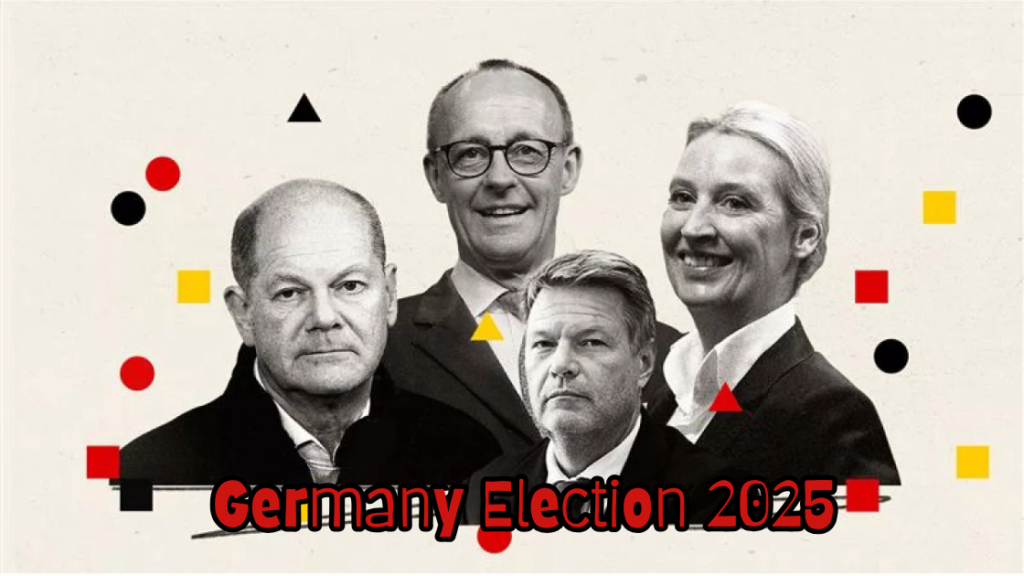
Contents
Germany Election 2025| 5 Shocking Shifts That Will Transform
Germany Election 2025| The 2025 German federal election, held on 23 February, significantly changed the country’s political landscape. The conservative Christian Democratic Union/Christian Social Union (CDU/CSU) coalition led by Friedrich Merz won 28.5% of the vote. This result means that Merz will be elected as the next Chancellor of Germany, pending the success of coalition negotiations.
Summary of election results
The election results are as follows:
- CDU/CSU: 28.5% of the vote, resulting in 208 seats in the Bundestag.
- Alternative for Germany (AfD): 20.8% of the vote, 152 seats.
- Social Democratic Party of Germany (SPD): 16.4% of the vote, 120 seats.
- Alliance 90/The Greens: 11.6% of the vote, winning 85 seats.
- The Left (Die Linke): 8.8% of the vote, 64 seats.
- Free Democratic Party (FDP): 4.3% of the vote, no seats due to failing to meet the 5% threshold.
- BSW: 4.9% of the vote failed to secure any seats.
- Germany Election 2025 Predictions
- Germany Election 2025 Results
While the CDU/CSU’s victory was significant, it was offset by the rise of the AfD, which achieved its best result to date. The SPD’s performance was its worst since World War II, reflecting a significant shift in voter preferences.
Must read my this post: One Piece Chapter 1140 Spoilers| 5 Shocking Twists Revealed!
Impact of coalition formation
Germany Election 2025 Analysis
Friedrich Merz has preferred a coalition with the SPD, stressing the need for a “fundamental change” in Germany. He has ruled out cooperation with the AfD, citing their controversial positions. Despite its poor performance, the SPD remains important in coalition talks.
A potential coalition between the CDU/CSU and the SPD will require careful negotiation to address policy differences and ensure effective governance. Germany Election 2025 Candidates|
Regional diversity and voter demographics
The election results highlight a clear geographical and political divide within Germany:
- West Germany: Traditional parties such as the CDU/CSU and SPD maintain strong support.
- East Germany: The AfD has gained significant traction, reflecting regional discontent and differing political priorities.
Demographically, the AfD’s support is significantly higher among male and younger age groups, while the SPD and Die Linke draw strong support from female voters and older populations. Germany Election 2025 Key Issues|
Challenges ahead
The incoming government faces several key challenges:
- Economic stability: Addressing the economic downturn and implementing policies to stimulate growth.
- Migration policy: developing strategies to manage migration effectively, balancing humanitarian responsibilities with national security concerns.
- Foreign policy: navigating complex international relations, particularly with the United States and Russia, and strengthening Europe’s defence autonomy.
The rise of the AfD creates additional complexity, as its policies often diverge sharply from those of traditional parties, which can affect coalition dynamics and policymaking. Germany Election 2025 Opinion|
What does the CDU/CSU victory mean?
The CDU/CSU victory signals a return to conservative leadership in Germany. However, the increased support for the AfD signals a shift in voter sentiment, which could affect future policy directions.
Why did the SPD perform poorly in this election?
The SPD’s poor performance has been attributed to various factors, including public dissatisfaction with its previous regime and the rise of alternative parties proposing different policy approaches.
What are the likely outcomes of the coalition talks?
While a coalition between the CDU/CSU and the SPD is possible, careful negotiations will be required to reconcile the differing policy positions. Due to ideological differences, including smaller parties or the AfD in a coalition is unlikely.
How could the rise of the AfD affect German politics?
The rise of the AfD reflects growing discontent among some segments of the electorate. Their increased representation could influence national debates, particularly on immigration and national identity.
What challenges does the new government face?
The new government must address economic challenges, formulate an effective migration policy, manage complex international relations, and manage the effects of the AfD’s increased influence.
- Germany Election 2025 Campaigns
- Germany Election 2025 Polls
- Germany Election 2025 Impact
- Germany Election 2025 Voting Trends
Conclusion
The 2025 German federal elections mark the beginning of a period of political change, with the CDU/CSU poised to lead the next government. The AfD’s rise and the SPD’s decline highlight a changing political landscape.
The upcoming coalition talks will be crucial in shaping Germany’s future direction. They will require a balance between traditional policies and voters’ growing concerns.
